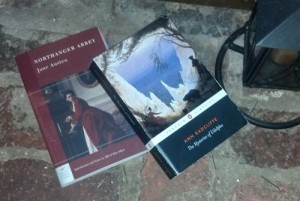 In reading The Mysteries of Udolpho by Ann Radcliffe and thinking about how it may have influenced Catherine Morland’s imagination in Northanger Abbey by Jane Austen I find myself wondering how much of the novel Catherine actually paid attention to.
In reading The Mysteries of Udolpho by Ann Radcliffe and thinking about how it may have influenced Catherine Morland’s imagination in Northanger Abbey by Jane Austen I find myself wondering how much of the novel Catherine actually paid attention to.
Granted, The Mysteries of Udolpho is a gargantuan read compared to most books I typically read in my modern 21st century life with no end of possible entertainment streams to choose from. My Penguin Classics copy is a mere 632 pages, but I should add that it is the most annoyingly condensed text with the smallest possible type face I have ever seen. However, in Catherine Morland’s hypothetical time, Udolpho could have been a four volume novel, roughly meaning that it would have been broken up into four books. This in my mind means that she could have spent more time reading one part more than the others–the way some of us read and re-read our favorite parts–and in doing so may not have kept the other volumes at hand to refer back to.
If this was the case, then I’m pretty sure volume one did not interest Catherine Morland quite as much as the other volumes. Catherine was probably swept up in the descriptions of a sublime landscape and then consumed by the strange things hinted at, but I’m guessing she did not attend to the words of St. Aubert to his daughter Emily.
In the first volume, chapter seven the dying St. Aubert attempts to pass on his wisdom.
…do not indulge in the pride of fine feeling, the romantic error of amiable minds. Those, who really possess sensibility, ought early to be taught, that it is a dangerous quality, which is continually extracting the excess of misery, or delight, from every surrounding circumstance. And, since, in our passage through this world, painful circumstances occur more frequently than pleasing ones, and since our sense of evil is, I fear, more acute than our sense of good, we become the victims of our feelings, unless we can in some degree command them…You see, my dear, that, though I would guard you against the dangers of sensibility, I am not an advocate for apathy. At your age I should have said that is a vice more hateful than all the errors of sensibility, and I say so still…
St. Aubert is basically saying to keep it real, don’t make everything into a drama, and keep life in perspective.
Catherine Morland eventually learns this through her own experience at Northanger Abbey with Henry Tilney putting her imagination in check by sharing the truth about his mother’s death, and how the whole family, including his father, had grieved at her passing.
…Dear Miss Morland, consider the dreadful nature of the suspicions you have entertained. What have you been judging from? Remember the country and the age in which we live. Remember that we are English, that we are Christians. Consult your own understanding , your own sense of the probable, your own observation of what is passing around you–Does our education prepare us for such atrocities? Do our laws connive at them? Could they be perpetrated without being known, in a country like this, where social and literary intercourse is on such a footing; where every man is surrounded by a neighbourhood of voluntary spies and where roads and newspapers lay every thing open? Dearest Miss Morland, what ideas have you been admitting?
It is one of the rare speeches in the entire novel of Northanger Abbey where we get a bit of the reverend from Henry Tilney. I imagine he was speaking with real concern, but there is a hint of scorn in his words. Remember, though, that Catherine had just alluded to her thinking that Henry’s father had killed his mother and sought to hide the crime from curious minds. However, Catherine takes Henry’s words to heart and finally admits to herself that there are no grounds for her fanciful suspicions.
The visions of romance were over. Catherine was completely awakened. Henry’s address, short as it had been, had more thoroughly opened her eyes to the extravagance of her late fancies than all their several disappointments had done.
In all honesty, I believe this is the truth of us all. No matter what others try to teach us or tell us of life, it is only through our own experience that we truly begin to understand. I’ll bet if Catherine re-read St. Aubert’s speech that it would strike her as particularly potent in retrospect.
P.S.
In reading St. Aubert’s dying words I am also reminded of another Austen novel, Sense and Sensibility. The characters of Elinor and Marianne Dashwood immediately spring to mind–Elinor being one who would command her feelings, while Marianne would be one who indulged in extracting excesses of misery and delight. I believe St. Aubert would say that it is one thing to feel what you feel and quite another to court and inflate those feelings to be larger than anything else.
I wonder if Elinor and Marianne ever had any discussions about Udolpho?
